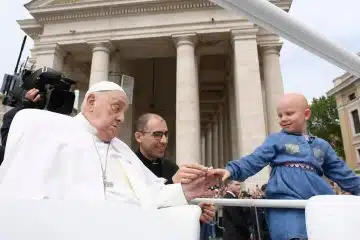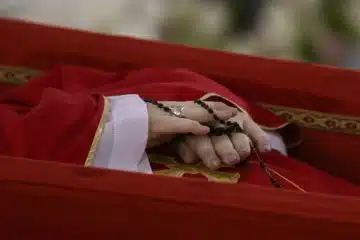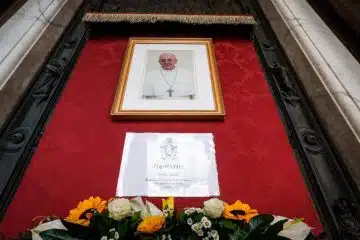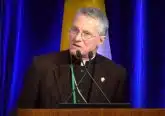Labor Day statement: Reflection, action ‘critical’ for care of workers
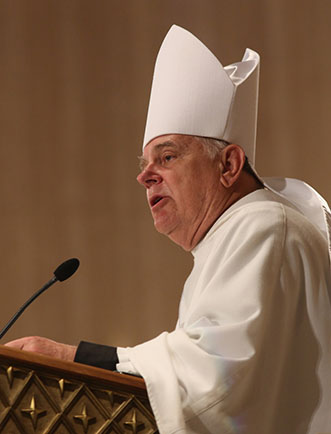
By Mark Pattison Catholic News Service
WASHINGTON — “Individual reflection and action is critical” when it comes to improving the conditions of workers in the United States and elsewhere, said Archbishop Thomas G. Wenski of Miami, chairman of the U.S. bishops’ Committee on Domestic Justice and Human Development, in the U.S. bishops’ annual Labor Day statement.
“We are in need of a profound conversion of heart at all levels of our lives. Let us examine our choices,” Archbishop Wenski said in the statement, dated Labor Day Sept. 7, but issued Aug. 24 in Washington.
“How do we participate in this wounding of human dignity,” he asked, through choices about the clothes we wear, food we eat, and things we buy — most of which is unaffordable to the very workers who make it? Do we give a thought to this truth, that for our wants to be met, economic realities are created that cause others to live in ways that we ourselves would not?”
Still, “individual effort should not stand alone.” Archbishop Wenski said. “Sufficient decent work that honors dignity and families is a necessary component of the task before us, and it is the Catholic way.”
He added, “In demanding a living wage for workers we give hope to those struggling to provide for their families, as well as young workers who hope to have families of their own someday. Unions and worker associations, as with all human institutions, are imperfect, yet they remain indispensable to this work, and they can exemplify the importance of subsidiarity and solidarity in action.”
Archbishop Wenski used as the basis for his remarks Pope Francis’ encyclical “Laudato Si’, on Care for Our Common Home,” quoting from it to illustrate his points.
While Pope Francis’ encyclical has been regarded as an encyclical on the environment, the pope said in it, “The analysis of environmental problems cannot be separated from the analysis of human, family, work-related and urban contexts, nor from how individuals relate to themselves, which leads in turn to how they relate to others.”
“Not long ago, jobs, wages, and the economy were on everyone’s mind. Unemployment, poverty and foreclosures soared as Americans worried, rightly, if we could ever recover. Even with some economic progress, things have not truly improved for most American families. We must not resign ourselves to a ‘new normal’ with an economy that does not provide stable work at a living wage for too many men and women,” Archbishop Wenski said.
“The poverty rate remains painfully high. The unemployment rate has declined, yet much of that is due to people simply giving up looking for a job, not because they have found full-time work. The majority of jobs provide little in the way of sufficient wages, retirement benefits, stability, or family security, and too many families are stringing together part-time jobs to pay the bills. Opportunities for younger workers are in serious decline.”
“Work is a necessity, part of the meaning of life on this earth, a path to growth, human development and personal fulfillment,” Pope Francis said in his encyclical.
Yet in the United States, according to Archbishop Wenski, “too many marriages bear the crushing weight of unpredictable schedules from multiple jobs, which make impossible adequate time for nurturing children, faith and community. Wage stagnation has increased pressures on families, as the costs of food, housing, transportation and education continue to pile up. Couples intentionally delay marriage, as unemployment and substandard work make a vision of stable family life difficult to see.”
The archbishop said, “Labor is one important way we honor our brothers and sisters in God’s universal human family. In the creation story, God gives us labor as a gateway into participation with him in the ongoing unfolding of creation.” Quoting Pope Francis, he added, “Human labor, at its best, is a deeply holy thing that ought to honor our dignity as we help God ‘maintain the fabric of the world.'”
“This Labor Day, the violation of human dignity is evident in exploited workers, trafficked women and children and a broken immigration system that fails people and families desperate for decent work and a better life,” Archbishop Wenski said. “How can we advance God’s work, in the words of the Psalmist, as he ‘secures justice for the oppressed, gives food to the hungry, (and) sets captives free”? These are difficult questions to ask, yet we must ask them.”
Posted August 24, 2015




